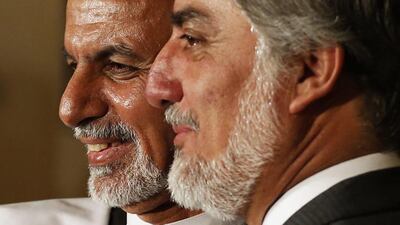KABUL // More than two years after a bitterly contested presidential race pushed Afghanistan to the brink of disaster, new divisions are opening up over plans to hold a parliamentary election this autumn.
Efforts to reform the electoral system have been met with opposition from MPs and rising insecurity has fuelled criticism that a free and fair vote will be impossible if the poll goes ahead as scheduled on October 15.
With public faith in the democratic process already low, there are concerns that another controversial election will only aid the Taliban-led insurgency.
But the prospect of the vote being cancelled is also threatening to reignite tensions within the national unity government, which was hastily put together in 2014 as the country hurtled towards outright civil war.
“In our elections we do not have anyone who will be happy with the results or silent in the face of the law,” said Farooq Bashar, a political analyst and professor at Kabul University. “We have this problem again and again.”
After one round of voting failed to produce a decisive outcome, the 2014 presidential election went to a run-off between the two leading candidates.
The subsequent race between Ashraf Ghani, an American-educated technocrat, and Abdullah Abdullah, a former foreign minister, polarised Afghanistan as both sides resorted to back-room deals, intimidation and fraud in an attempt to land a knockout blow.
Months of turmoil ended only when the US secretary of state John Kerry brokered an agreement for the rival camps to form a national unity government headed by Mr Ghani. Mr Abdullah accepted the compromise position of chief executive on several conditions, including a plan to create the post of prime minister after two years.
This was to be done following unspecified “fundamental changes” to the electoral system and the holding of a parliamentary election. A national council of tribal elders and political leaders, known as a loya jirga, would then be convened to agree on the role of the prime minister and discuss amending the constitution.
Efforts at reform have repeatedly stalled, however, throwing this entire process and the government’s future into doubt. In mid-June members of the lower house of parliament rejected a decree aimed at controlling who should sit on the country’s two electoral bodies, the Independent Election Commission and the Independent Electoral Complaints Commission.
Although not a fatal setback, the decision symbolised the mood of a nation increasingly frustrated with politicians of all persuasions.
One MP, Rangina Kargar, said the government was only trying to entrench its power, rather than carry out genuine reform.
She told The National that Mr Ghani and Mr Abdullah had agreed to carve up the Independent Election Commission between themselves, installing their supporters in an even split across the organisation.
“Then after the election the parliament will be composed in the same way as the government, 50:50 between the two leaders,” she said.
A later decision by the upper house of parliament to support the decree only seemed to underline the political divisions within the country. Unless it turns to the supreme court for help, the government still requires approval for the decree from both houses before it can move forward.
Much of the opposition to the autumn election can be traced to the palpable anger that still lingers from the 2014 presidential campaign.
There remains huge discontent at the way Washington decided to get involved in the outcome, with critics adamant that the deal brokered by Mr Kerry severely undermined the democratic process.
Ms Kargar called the position of chief executive “illegal” and Mr Bashar, the Kabul University professor, said the current government was illegitimate.
Sharp differences within the administration and opposition from parliament have been consistent problems throughout the past two years. For months the government struggled to agree on a cabinet. Even when it did so, it often failed to win approval for its nominees from the requisite number of MPs.
These rifts left key positions including the ministers of defence and interior temporarily filled for long periods. Recent reports in the local media have also indicated that the first vice president, Abdul Rashid Dostum, is increasingly unhappy with the way the administration is divided between two distinct factions.
Speculation persists that the prospective prime minister, Mr Abdullah, is far more determined to hold the election in October than Mr Ghani. The vote has already been postponed once because Mr Ghani and Mr Abdullah failed to agree on the reform process.
On June 21, the UN’s outgoing special representative for Afghanistan, Nicholas Haysom, warned that, “Continued uncertainty about the electoral calendar will contribute to challenges to the legitimacy of both the national unity government and the parliament, which has long overstepped its term of office.”
He added that an “increasingly vocal” but divided opposition was demanding a new government.
Failure to make any progress in peace talks with the Taliban has only added to the pressure on the administration. The insurgents control large swathes of the countryside and vowed to continue fighting after a US drone strike killed their leader Mullah Akhtar Mansour in May.
In the Taliban stronghold of Helmand, in southern Afghanistan, one civil society activist said an October election would be “impossible” and “illegal”. His concerns were echoed elsewhere.
In the eastern province of Kunar, Haji Rahim Dad Safi ran unsuccessfully to become an MP when the last parliamentary elections were held in 2010. He also campaigned for Mr Ghani to become president in 2014. Both experiences left him disillusioned and angry.
“Elections are a rule of democracy and normally they should be held, but not here,” he said. “They always help people who use guns and influence to come to power.”
foreign.desk@thenational.ae
* Chris Sands contributed to this story from the UK

